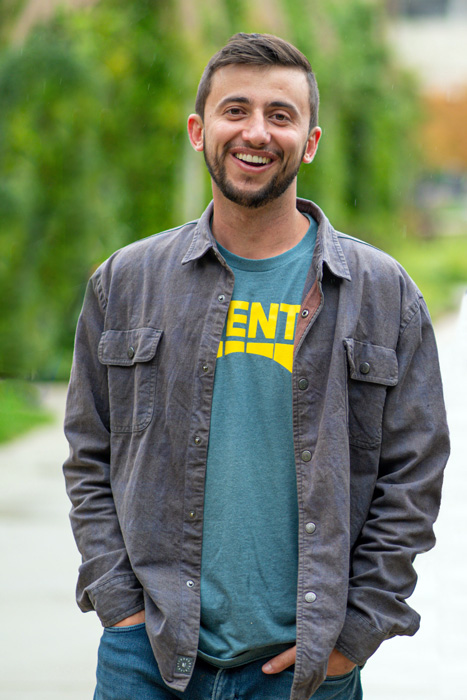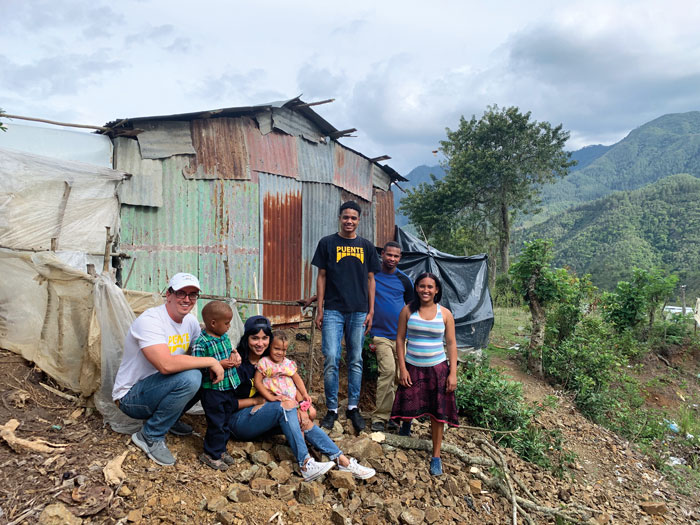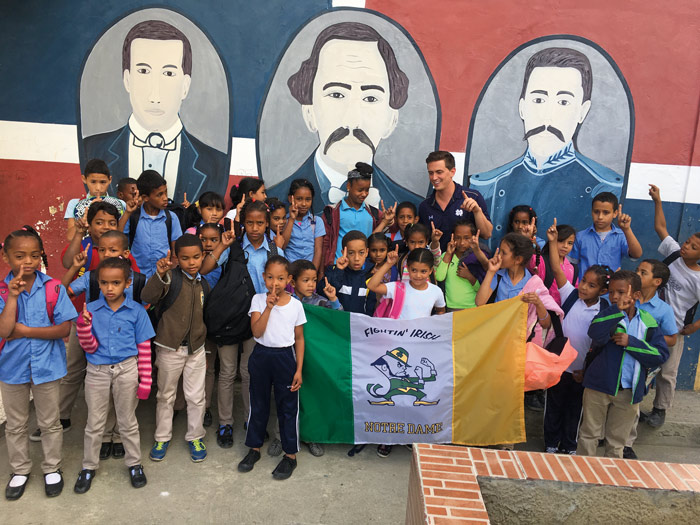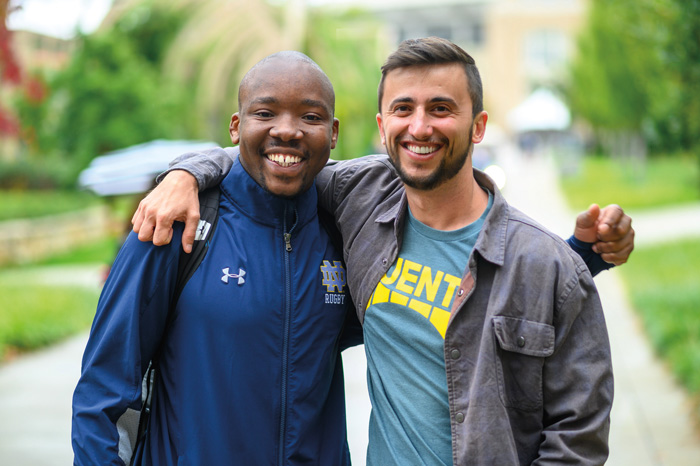POWER OF THE PUENTE
ASK MORE
Paul Anthony holds a 2015 finance degree from the Mendoza College of Business at the University of Notre Dame. Like many of his classmates, he landed a lucrative job at a respectable investment bank straight out of school. Looking back, he uses the word “prestigious” to describe it.
Four years out from graduation, he’s been installing toilets for a living.
Now, not to knock plumbing as a profession, but under normal circumstances, it would be reasonable to wonder what went wrong in Anthony’s career.
 “You know what,” the 27-year-old says by phone from his home in a mountain town in the Dominican Republic. “I think the quarter-life crisis is a very real thing.”
“You know what,” the 27-year-old says by phone from his home in a mountain town in the Dominican Republic. “I think the quarter-life crisis is a very real thing.”
But to hear Anthony unfold his story — and explain the whole toilet aspect — is to understand that his circumstances aren’t normal. It’s to grasp all that’s going right in his life.
Anthony is the chief financial officer of Puente Desarrollo Internacional, a nonprofit startup yet to celebrate its second birthday. The name means “bridge international development,” and according to the Puente website, the “bridge” is the long-missing span between data and the day-to-day decisions of humanitarian relief work. But give the concept a half turn and the data itself becomes the bridge linking the most pressing needs of people who live in impoverished communities and the vital expertise and resources of the organizations that hope to serve them.
Back in the spring of 2017, Anthony visited his friend Scott Coppa (ND ’15), a classmate at Notre Dame and at South Bend’s St. Joseph High School. Coppa was in the home stretch of his tour in the Peace Corps, and the two had raised money for the construction of a basketball court in Constanza, the small city in the DR’s central mountains where he’d served for two years. By day, the friends cleared the lot and laid down the court surface. By night, they talked about all that Coppa had experienced.
Something happened to Anthony during that week in Constanza, and he knew it even as he left Coppa to finish the court and returned to Chicago to start a new job in venture capital. “That time visiting Scott was really the first time I ever felt jealous of one of my friends,” he says.
Anthony knew he didn’t want to chase colleagues making bigger salaries — or seek out a more stable and comfortable career path. “But when I visited
Scott, I saw the way he had integrated himself in that community and how fulfilling his work was — the fact that he could really see the difference of his labor, and that it impacted people’s lives so strongly.” The two kept in closer touch that summer and kicked around some ideas that Coppa and another Peace Corps volunteer, Hope Tambala, felt would have made their efforts more effective.
First, they needed accurate and complete information on people’s needs. Better data, and lots more of it, to solve problems with greater efficiency. Second, they wanted stronger connections with local leaders who understood organizations like the Peace Corps and could become advocates or even coordinators of projects in their communities. The development world had to up its ground game — and not just in the DR. But since Constanza was what they knew, that’s where they would begin.
 Those ideas became Puente within a year. Back at his alma mater, the University of Michigan, to study informatics and software design, Tambala began developing the proprietary smartphone application and web-based interface that would become Puente’s survey instrument and data analysis tools. Coppa soon hired Crismary Gutierrez to coordinate Puente’s outreach efforts in and around Constanza.
Those ideas became Puente within a year. Back at his alma mater, the University of Michigan, to study informatics and software design, Tambala began developing the proprietary smartphone application and web-based interface that would become Puente’s survey instrument and data analysis tools. Coppa soon hired Crismary Gutierrez to coordinate Puente’s outreach efforts in and around Constanza.
Meanwhile, in Chicago: “I think I had sufficiently showed my bosses that I wasn’t taking full interest in the job,” Anthony says. By March 2018, he’d agreed to direct Puente’s financial affairs; by April, he’d worked his last day in venture capital; by June, he was on a plane to the Caribbean with his career direction in a 180 and his life in tow.
“So the way I thought was if I didn’t do it at that stage of life when I’m single and 25 and interested — passionate, even — then I was never going to do it,” he says. “It felt like just continuing to climb the corporate ladder, without much interest in doing so, was actually a bigger personal risk than taking this opportunity to do something different and see where it goes....I felt like taking this risk would show people a little bit more of who I really am.”
That still means applying his finance skills: driving Puente’s revenue model, building partnerships, soliciting donations, finding grants, shaping presentations. “I think I’m probably the only data analyst in international development that underwent intense training at the hands of Wall Street trading firms and investment bankers on how to use Excel and PowerPoint. And frankly, you’d be shocked at how much of an advantage that is. Our clients now receive their data in very clean looking, dynamic Excel dashboards for easy digestion and analytics. And I build those dashboards pretty easily because I used to analyze data sets that were the same size and larger when I was tearing through company financials.
“I was lucky enough to be put in front of management teams and other people far more senior than me on a frequent basis. That really helps when it comes to telling our story and connecting with more people that can be helpful to Puente’s mission.”
Of course, needs surveys and data collection are nothing new in the international relief and development world. It’s just that for too many organizations, they’re still a pencil-and-paper affair. Households needing assistance might respond to multiple questionnaires from different NGOs in the same year, yet that information is seldom shared, Anthony says. A collaborative approach that builds reliable, up-to-date data sets, creating a detailed picture of the housing, nutritional and public health needs across an entire community, could be transformative.
Thus the need for a bridge. A Puente. Anthony says the organization already has four client-partners — three global health NGOs that use the app to find and monitor patients, and a grantmaker that sifts Puente’s data to validate projects it wants to underwrite. All together, they’ve surveyed more than 7,000 people in Constanza and the coastal city of San Pedro de Macorís so far.
 But Puente isn’t just about surveys and analysis. The organization, which has trained a miniature army of volunteers and helped to create full-time employment for five Dominicans, also conducts its own small-scale projects that illustrate what Anthony calls “the power of the Puente network.” And the self-described “back office guy” doesn’t exempt himself from the harder labor. In these still-early but busy days of Puente’s mission, he takes a day or two each week to leave the house in Constanza that serves as both home and workspace and gets his hands dirty digging septic pits and building bathrooms.
But Puente isn’t just about surveys and analysis. The organization, which has trained a miniature army of volunteers and helped to create full-time employment for five Dominicans, also conducts its own small-scale projects that illustrate what Anthony calls “the power of the Puente network.” And the self-described “back office guy” doesn’t exempt himself from the harder labor. In these still-early but busy days of Puente’s mission, he takes a day or two each week to leave the house in Constanza that serves as both home and workspace and gets his hands dirty digging septic pits and building bathrooms.
The toilet story begins in early 2019 with a group of Puente volunteers passing through the remote village of Los Gajitos in the hills west of Constanza. What they saw was a collection of houses in such poor shape that several were collapsing or overgrown by foliage. The need for a housing project was obvious, they reported back. “So we told them, ‘Before you can do anything else, you have to go in and survey a certain percentage of the community,’” Anthony says.
The data revealed a higher priority. Roughly 40% of the 100 or so households had no bathroom of any kind. These families were defecating into plastic bags and disposing of them outside. At the same time, nearly 70% of residents were drinking unfiltered water. Nearly half of those who registered this problem also reported recent or chronic gastrointestinal issues.
Within a week, relying on the help of a talented local leader named Valentín Brioso de la Cruz, Puente had built three new bathrooms — cinderblock additions with concrete floors and brand-new toilets connected by PVC pipes to latrine pits at a safe distance away.
As the project expanded over the summer, Anthony presented the data to a pair of partner organizations that added drinking water filters and money for additional toilets. At last count, the project had installed 27 toilets and 39 filters at a total cost Anthony estimates at less than $14,000. “So the Puente network is about having the data that points you in the right direction and effectively plans your project for you,” he says. “And then it’s about the partner organizations that are willing to step up when we show them where a need exists and give them the ability to execute on it.”
It’s a model he hopes will scale up across the DR and into other countries as potential clients see the value of the information, the collaboration and what they can contribute both as information gatherers and service providers. In its first year, as its CFO worked on his Spanish and adjusted to expat life, Puente cleared $10,000 in revenue from its software and services. He hopes to see six figures within five years and the capacity to hire grant writers who can translate precise needs into life-changing development projects.
The challenges continue, but that’s fine with Paul Anthony. “They’ve brought tons of excitement and energy and joy to my life.”
Photos by Matt Cashore and provided.
ASK MORE OF BUSINESS ™
Mendoza Business’ Ask More of Business™ feature is part of a series of stories highlighting Mendoza students and alumni who fulfill the College’s mission by using business as a force for good in society.
A BROTHERLY CONNECTION
It was a lovely, thoughtful note.
 “I am a Notre Dame rising senior in Business Analytics and Political Science. I would like to nominate my host brother, Paul Anthony (BBA ’15) to be featured in the Mendoza magazine. “I think his work is worth highlighting to inspire past, current and future Mendoza students of the impact our education can give us.”
“I am a Notre Dame rising senior in Business Analytics and Political Science. I would like to nominate my host brother, Paul Anthony (BBA ’15) to be featured in the Mendoza magazine. “I think his work is worth highlighting to inspire past, current and future Mendoza students of the impact our education can give us.”
Takunda Ushe’s note went on to describe how his friend Paul exemplified the magazine’s “Ask More of Business” feature, which profiles our students and alumni who fulfill the College’s mission by using business as a force for good in society. Anthony certainly did that through his nonprofit, Puente Desarrollo Internacional, which uses proprietary technology to power sustainable development initiatives in underserved communities in the Dominican Republic.
Ushe, a native of Zimbabwe, explained that Anthony’s family had served as his host family when he came to Notre Dame, helping him settle in a very foreign place. Then we discovered Ushe was pretty amazing, too, having founded at age 16 a social enterprise Circle of Influence Projects Society for high school students in South Africa, among his many, many accomplishments. His determination and vision for Africa made him a natural candidate for our “Salt & Light” feature, which profiles Mendoza folks who live the mission of service in their personal lives.
It seemed only right to tell their stories together, connected by Notre Dame, friendship and their respective ambitions to shape a different world for those for whom daily existence is a struggle.

Comments